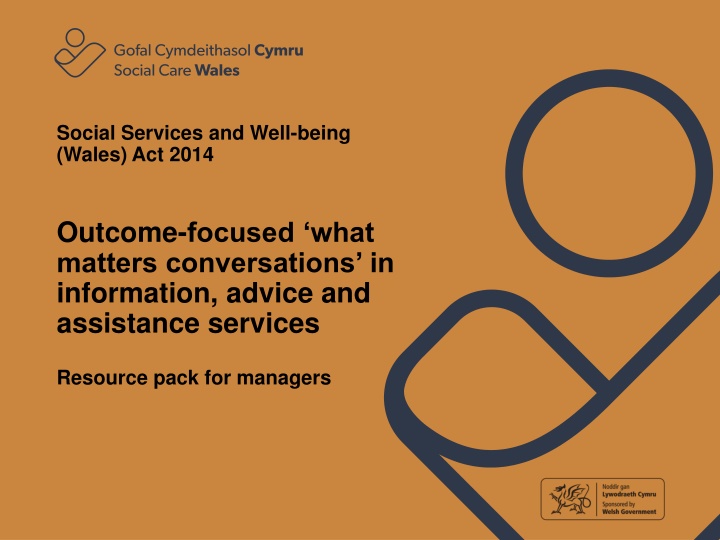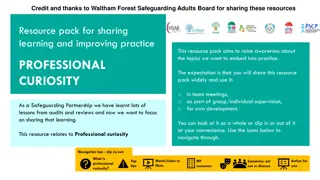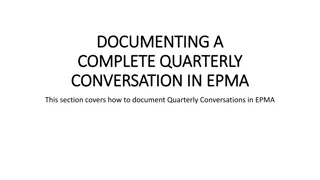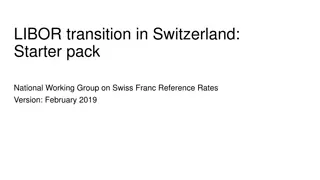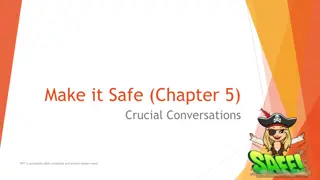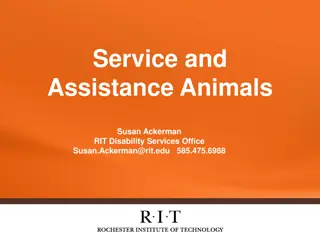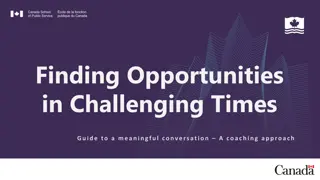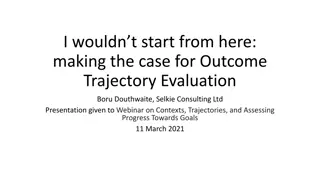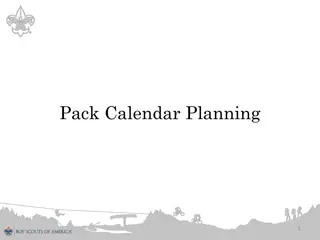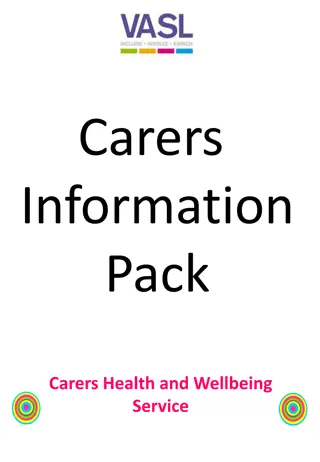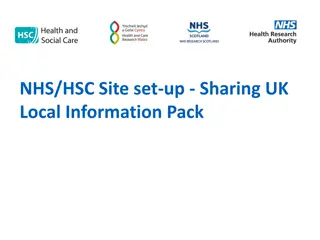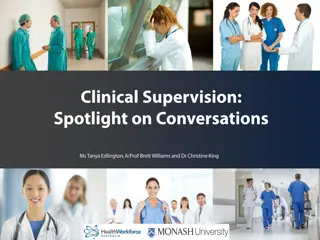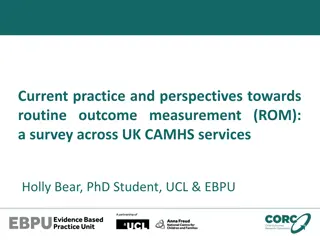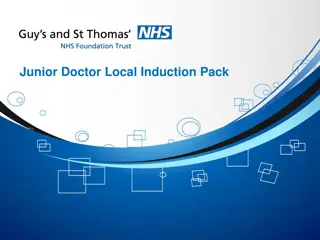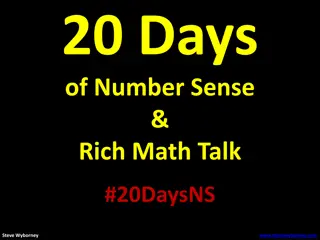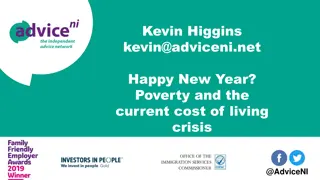Outcome-Focused Conversations in Information, Advice, and Assistance Services Resource Pack
This resource pack focuses on supporting outcome-focused conversations within the Information, Advice, and Assistance (IAA) services in accordance with the Social Services and Well-being (Wales) Act 2014. It covers key elements of good conversations, organizational buy-in, necessary skills, and actions for sustaining change. Confidentiality, respect, and creating a conducive learning environment are emphasized throughout the resources. Explore and enhance what matters in IAA services through better conversations and sustained changes.
Download Presentation

Please find below an Image/Link to download the presentation.
The content on the website is provided AS IS for your information and personal use only. It may not be sold, licensed, or shared on other websites without obtaining consent from the author.If you encounter any issues during the download, it is possible that the publisher has removed the file from their server.
You are allowed to download the files provided on this website for personal or commercial use, subject to the condition that they are used lawfully. All files are the property of their respective owners.
The content on the website is provided AS IS for your information and personal use only. It may not be sold, licensed, or shared on other websites without obtaining consent from the author.
E N D
Presentation Transcript
Social Services and Well-being (Wales) Act 2014 Outcome-focused what matters conversations in information, advice and assistance services Resource pack for managers
Index Aim and objectives Learning environment Introduction to resources Section 1 Our own experience Section 2 Vision for the service Section 3 Outcome-focused conversations Section 4 Better conversations Section 5 Sustainability Summary Next steps www.gofalcymdeithasol.cymru www.socialcare.wales
Aim and objectives Aim To support what matters and outcome-focused conversations within IAA Objectives Understand the legislative context of the IAA service Identify the key elements of a good what matters /outcome-focused conversation Explore the organisational buy-in needed to have better and different conversations with our public and professional colleagues Explore the skills required of workers (by sampling exercises) Agree actions needed for sustaining change www.gofalcymdeithasol.cymru www.socialcare.wales
Learning environment Confidentiality Respect One at a time Ask any question Phones on silent/wobble Stay on topic (please) Enjoy! www.gofalcymdeithasol.cymru www.socialcare.wales
Introduction to the resources Resource pack for managers Skills-based pack for workers www.gofalcymdeithasol.cymru www.socialcare.wales
Section 1: Our own experience www.gofalcymdeithasol.cymru www.socialcare.wales
Key questions to explore i) Are we clear about what the Act says about the three elements of information, advice and assistance? ii) What do we think it means for information, advice and assistance services within our organisation? iii) What might be the key changes we need to make to our operational, management and quality control aspects? www.gofalcymdeithasol.cymru www.socialcare.wales
Social Services and Well-being (Wales) Act 2014 The IAA service plays an important part in meeting the principles of the Act The what matters conversation sets the scene for establishing positive relationships with people, which are based on co-production Conversations in the IAA services will focus on helping people: think about their circumstances identify their strengths and those of their family and community consider how well-being can be supported It gives permission to do things differently www.gofalcymdeithasol.cymru www.socialcare.wales
What is information, advice and assistance (IAA)? Information Advice Assistance Providing data to the person Exploring options with the person Taking action with the person Engaging in a conversation Vital component of prevention Enables people to take control and make well-informed choices www.gofalcymdeithasol.cymru www.socialcare.wales
The IAA experience The information, advice and assistance service will be easy to use, welcoming and informative A positive experience, with responses that are informative and knowledgeable Re-assures the person that the advice given is impartial and in their best interests Makes the person feel they have reached someone who first and foremost listens to them Gives people an opportunity to explain what matters to them Gives people a chance to explore what options are available Enables people to find the help they feel is right for them so they can achieve their personal outcomes www.gofalcymdeithasol.cymru www.socialcare.wales
5, 15 or 50 minutes Whether we have five minutes or five hours, skilled listening is vital. Skilled staff enable people to clarify their thinking and express what matters most to them. If we believe this, we need to create environments that allow staff to practise in this way. We win and the individual and their family win Myth:You don t necessarily need a significantly longer period of time to have an empowering / strengths-based conversation with somebody It can just depend where you start! www.gofalcymdeithasol.cymru www.socialcare.wales
Listening, empathising and reflecting If we start the conversation with a series of questions, how are we making people feel? Confused, under pressure, feeling they might fail the assessment and that they have to exaggerate the issue to get a service If we start the conversation simply by listening, empathising and reflecting, we can get alongside somebody. People value being heard and then we might, for example, go on to ask what if anything happened today to prompt them to pick up the phone www.gofalcymdeithasol.cymru www.socialcare.wales
Exercise: What is our driver? What might be the consequence of continuing to be driven by the idea of eligibility criteria and service-led assessments, and using that as the basis of our interaction with people who come to us for help? www.gofalcymdeithasol.cymru www.socialcare.wales
Section 2: Vision for the service www.gofalcymdeithasol.cymru www.socialcare.wales
What is the vision for your IAA service? Do you know what your IAA service looks like or needs to look like? Can you describe it to other colleagues? Can you describe it to your customers? Do other professionals know what you re trying to do? Do other professionals understand the part they need to play? If yes, how do you know? If no, what needs to happen so you do? Why can or can t you describe it? And what needs to happen so you can? If no, what would help them better understand? www.gofalcymdeithasol.cymru www.socialcare.wales
Exercise: Who is impacted by IAA? Who is impacted by IAA? How might each stakeholder be impacted by it? Elected members The public Council-wide departments Senior managers Customer services Statutory assessment and social work teams Third sector partners Provider services Health partners www.gofalcymdeithasol.cymru www.socialcare.wales
Section 3: Outcome-focused conversations www.gofalcymdeithasol.cymru www.socialcare.wales
An outcomes-based approach An outcomes-based approach is based on these principles: people are experts in their own lives they are best placed to tell you what s important to them and what gives them a sense of well-being people want to do the things that matter most to them, in their own way people s strengths are important and need to be acknowledged we start by identifying what the person wants to achieve and work with them to identify how this can be done the person s family, carers and local community can also contribute to this plan Meaningful conversations are central to understanding a person s outcomes www.gofalcymdeithasol.cymru www.socialcare.wales
What is a personal outcome? A personal outcome is the picture the person paints of what it is they want to achieve, how they want to feel or how they would like their life to be A sense of well-being comes from things like: relationships feeling loved being respected having a sense of purpose making a useful contribution the little things... that make life feel worthwhile www.gofalcymdeithasol.cymru www.socialcare.wales
IAA outcomes checklist Remember personal outcomes have to be: realistic achievable described through actions impacting sustainable www.gofalcymdeithasol.cymru www.socialcare.wales
Measuring outcomes An approach to measuring outcomes needs to: evidence the impact of the approach support the conversation, rather than drive or hinder it be easy to understand and use enable local analysis of quality and satisfaction align with existing or developing management processes apply to all client groups be described as much as possible in the individual s language www.gofalcymdeithasol.cymru www.socialcare.wales
Taking a strength-based approach A focus on people s strengths is a key part of an outcomes-focused approach, but this means asking the right kind of questions and letting the conversation flow: focus on people s strengths engage with people and help them explore their hopes and fears before putting a plan in place explore the pro and cons help people think and talk help people build on their strengths and those of their family and community help people notice their achievements and anticipate threats. www.gofalcymdeithasol.cymru www.socialcare.wales
Having a what matters conversation Personal circumst ances Personal outcomes what matters Risks Be curious Strengths and capabiliti es Barriers to achieving outcomes Delve deeper www.gofalcymdeithasol.cymru www.socialcare.wales
Exercise: How do you define a good what matters conversation? In small groups, identify the features you expect to hear when staff are holding good what matters conversations www.gofalcymdeithasol.cymru www.socialcare.wales
Section 4: Better conversations www.gofalcymdeithasol.cymru www.socialcare.wales
The key elements of good communication Showing that you are listening Expressing empathy and warmth Asking the right questions so there is clarity about concerns Showing support by recognition of individuals strengths Showing patience Appearing knowledgeable and effective www.gofalcymdeithasol.cymru www.socialcare.wales
5 stages of the conversation 1. Open, engaging questions 2. Active listening 3. Open, exploratory questions 4. Information exchange 5. Summary and actions www.gofalcymdeithasol.cymru www.socialcare.wales
Exercise: What are the skills and competencies needed What are the most important skills and competencies needed to facilitate and support effective what matters conversations? www.gofalcymdeithasol.cymru www.socialcare.wales
Focusing the skills Listening and expressing empathy Exploring concerns and aspirations Expecting natural defensiveness Helping people understand and value their strengths Avoiding arguments and confrontation Enables you to: notice people for the problems they face, not just the problems they cause notice people s abilities to alter their own course and offset their own risk and concerns focus on their hopes and aspirations notice the strengths of families / groups / units and support what's important to them, building on their resilience make better decisions (with the individual) based on the right information signpost, if needs be, to the most appropriate services www.gofalcymdeithasol.cymru www.socialcare.wales
IAA competency framework Professional practice Providing assistance Providing advice Providing information Person www.gofalcymdeithasol.cymru www.socialcare.wales
Relationship-based practice How we think about someone or something affects what we do about it we are all influenced by our individual moral code Do managers agree? Our approach to the issue therefore affects the outcome Do managers agree? As IAA, we are engaged in a dynamic process and in any encounter between a worker and an individual, there should always be two people learning! Do managers agree? Why and how might that be? The result should be self-empowering for the family or individual www.gofalcymdeithasol.cymru www.socialcare.wales
Empathy and openness Evidence-based practice, experience and research show us that adopting an empathetic approach during our conversations results in: less resistance and more disclosure www.gofalcymdeithasol.cymru www.socialcare.wales
Effective practitioners Do: make a commitment stay calm and purposeful stay focused on the most important issues acknowledge the challenge and feelings build on the strengths explore the individual s hopes and aspirations respect the individual s skills, knowledge and expertise Try to avoid: rescuing, advising, telling or doing to rather than with www.gofalcymdeithasol.cymru www.socialcare.wales
Section 5: Sustainability www.gofalcymdeithasol.cymru www.socialcare.wales
Sustaining an outcome-based approach Is your approach to IAA understood throughout the department? Do you have corporate support for a different way of working? Consider whether your system drives or supports practice. What needs to change? Before training, plan follow-up sessions that can maintain the momentum of the approach, such as a frontline session once a week (peer support space where a positive case can be brought and discussed learning from each other) Your team leader needs to be fully up-to-speed and able to support staff who get stuck Relationship between IAA and specialist teams needs to be agreed. A strengths-led approach should be continued by specialist teams, giving consistency of experience to the individual www.gofalcymdeithasol.cymru www.socialcare.wales
Supervising and supporting As managers you need to think about how practitioners capture and build on their successes, learn from their challenges and improve The focus needs to be on: identifying what works, promoting evidence-informed practice and generating practice-based evidence drawing on the lived experience of people who use services, practitioners and other stakeholders improving professional confidence and professional knowledge in the individuals and teams taking part improving the learning of the organisation as a whole identifying how services can work more effectively with reducing resources www.gofalcymdeithasol.cymru www.socialcare.wales
Outcome-focused supervision Outcomes focused supervision can be structured using the following discussion framework: what are we working towards (outcome)? what is working well (strengths)? what are we worried about (priority risks)? what needs to happen (what options are we exploring)? where are we now (what has been the progress so far)? where do we want to be (what are the next steps)? www.gofalcymdeithasol.cymru www.socialcare.wales
The Kolb approach to reflection What happened before the event? What did you expect? What happened during the event? What happened afterwards? What is the situation now? What information do you have? What information is missing? How can you find out about these things? What is your plan? What is your contingency plan? Concrete experience (doing/ having an experience) Active experiment a-tion (planning/ trying out what you have learned) Reflective observation (reviewing/ reflecting on the experience) Abstract conceptual- isation (concluding/ learning from the experience) What went well? Why? What did not go well? Why? Has how you think of the event changed following these questions? Why? What did you feel before the event? What did you feel during the event? How do you think the other person felt? How do you feel about the event now? www.gofalcymdeithasol.cymru www.socialcare.wales
Exercise: What is your approach to supervision? In pairs, consider what has been shared with you today and identify what your approach to supporting staff providing IAA looks like and consider the following questions: does it provide opportunities for practitioners to reflect? is it a strength-based approach? is it outcome focused? does it promote and support the development of skills, knowledge, experience and confidence? www.gofalcymdeithasol.cymru www.socialcare.wales
Summary www.gofalcymdeithasol.cymru www.socialcare.wales
Summary Legislative shift in policy to be more focused on well-being Person-centred practice based around an individual s outcomes Importance of good relationships Adopting a strength-based approach Effective conversations based on the five stages to a good conversation www.gofalcymdeithasol.cymru www.socialcare.wales
Next steps Where do you need to start and with what or whom? Share your learning and the learning of the team in team meetings Reflect on case discussions Review your progress and ask yourself: What have I noticed myself doing? What have I noticed others doing? www.gofalcymdeithasol.cymru www.socialcare.wales
Diolch Thank you gofalcymdeithasol.cymru socialcare.wales
